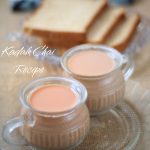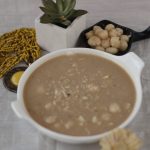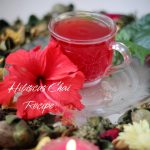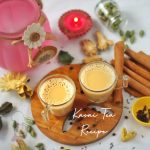Sip in a cup of Sulaimani Chai this monsoon, that comes with a zing and enjoy the season with your favorite show in the television. Also, accentuate your sense of admiration by taking a sneak peek into its history and culinary journey while relishing the chai, and of course you will be fascinated by it.
Table Of Contents:
1. Introduction
2. An Insight Into Kerala's Tea Estates
3. Tea Varieties That Are Harvested In Kerala
4. Method Of Tea Cultivation
5. A Word On Sulaimani Chai
6. Nutritional Value
7. Ingredients Needed To Make Perfect Sulaimani Chai
8. Step wise Directions To Make Sulaimani Chai
9. Tips To Consider
10. Faqs
11. Characteristics Of Sulaimani Chai
12. Suitable Combinations
13. Feel That May Suit Your Taste
14. Other Chai Varieties From Indianfoodsrecipes That You Would Like
Introduction:
Kerala, the green state in the South west part of India fondly called as "God's own country" has much adorable feathers in its cap ranging from its art forms and culture to rituals and beauty. It has a primitive history with a lot of colonial influences and certainly it is a state of pure bliss. Its back waters, coconut farms, hill stations, beaches, temples, churches, monuments and vivid landscapes all speak about its tradition, pomp and glory and nevertheless its food culture happens to be a never ending fascination that attracts a large number of tourists day in and day out.
An Insight Into Kerala's Tea Estates:
Tea estates are an exclusive phenomena in Kerala and the " Tea Museum" in Munnar is stunning and breath-taking. The museum tells about the history of tea and exhibits a perfect portrayal of its origin, evolution and establishment over the decades. The tea plantations will enchant us with its lush green charm and serenity and the vast extensions of such lovely greenery will certainly mesmerize anyone at the very sight of it.
The fresh aroma of numerous tea flavors will take you to another world and you would immerse yourself in nature for a while. A few thousand feet above the sea level, these tea estates would enthrall the tourists with its captivating overview. The green carpet of dense tea plants spread uniformly in an array over the slopes is indeed a magnificent sight to look at. The months between September to March is ideal to visit the tea fields as the climate is conducive for travel and there is less rain preferably.
Tea Varieties That Are Harvested In kerala:
Kerala Bop organic, poabs organic, south India white oothu organic, korakundah black tea and Indian white tea are the major types of tea varieties which are grown extensively in Kerala. Mild and light oolong, green tea and black tea are cultivated throughout the year. Idukki, Wayanad, Palakad, Kollam, Thrivananthapuram, Nelliampathy, Mankulam, Meppadi, Pallivasal and Mananthavady are some of the popular tea growing zones in Kerala.
Method Of Tea Cultivation :
Scattering of seeds is the ideal method followed till date for tea plantation though high yielding saplings are also common nowadays and both the methods are used for commercial purposes. The tea plants grow dense and wild and usually grows up to fifteen or sixteen feet high. Hand- picking the tea leaves is the traditional way of plucking them and it has been in practice since several decades. It proves to give more freshness and the hand-plucked leaves are subtle and delicate than the leaves collected from machine plucking method.
A Word On Sulaimani Chai:
It is a humble chai made by brewing tea leaves in hot water and spruced up with some aromatic herbs like ginger, cardamom, cinnamon and cloves. Just with a few drops of lemon, this Sulaimani chai gives a zing when slurped in after a heavy exotic spicy meal. Fondly, called as "kattan Chai" this tea, is an indispensable element in every household of Kerala. Tea shops are the localites' favorite hangout spots, wherein the people who go out for work, discuss local events, day today activities in the area, the common programs, current affairs and so on in these delightful spots while sipping multiple cups of kattan chai mostly accompanied by a "kadi" and it is a lovely sight for the tourists to watch such serene scenario.
Try it by yourself when you make a trip to Munnar or Cochi or anywhere in Kerala and you are sure to fall for the people's humble life, simple routine, unpretentious conversation and above all their heart warming hospitality that draws people in.
Here comes the simple yet scintillating recipe of Sulaimani Chai that can be prepared in a jiffy.

Ingredients Needed To Make Delicious Sulaimani Chai:
1. Tea Powder: A teaspoon of any tea you use regularly.
2. Water: Just take one and a half cup of water to boil.
3. Sugar: A teaspoon of sugar to sweeten the chai.
4. Cinnamon: An inch of cinnamon stick is dropped in to add flavor.
5. Cloves: One or two cloves as flavoring agent.
6. Cardamom: Added just like cloves to add flavor.
7. Ginger: Just added to get the piercing punch.
Step wise Directions to Make Sulaimani Chai:
1. Boil Water And Add The Spices: Boil one and a half cups of water and add the spices one by one.
2. Brew The Tea: Add the tea powder and sugar and boil.
3. Serve Hot: Squeeze in a few drops of lemon juice and serve it hot topped up with mint bits.
Heat a vessel and pour in one and a quarter cup of water and let it boil in high flame. While it starts boiling, just drop in an inch of cinnamon roll followed by one or two cloves. Drop in two green cardamom after crushing it roughly. Plop in a little crushed ginger and stir in.
When you get the nice aroma of spices, add a teaspoon of sugar and when it melts down dust in a teaspoon of tea powder and let it boil for a minute.
Strain the Sulaimani tea using a filter and squeeze in a few drops of lemon. Garnish with one or two mint leaves and serve hot with pazham pori or ela ada.
Tips To Consider:
1. Add the spices when the water comes to a boil and wait for a minute or two to get the aroma and the desired light golden color.
2. Do not boil the Sulaimani tea too much after adding the tea powder as it may tend to become bitter.
3. You have to add the lemon juice only after turning off the flame.
4. Just close the teapot with a lid for a minute or two to get the delicious infusion.
5. You can also substitute sugar with jaggery or palm candy though the native version adds sugar mostly.
6. Crush the cinnamon piece and cardamom pods using a mortar and pestle to get its intense flavor.
Faqs:
1. Can we add any variety of tea powder to make Sulaimani Chai?
Yes, you can use your regular tea powder (both dust and granules) to make Sulaimani chai.
2. Can we add any other sweetener other than sugar?
Yes, by all means you can add jaggery, palm sugar, honey and rock candy for Sulaimani chai if you choose to avoid sugar. But add all these ingredients after turning off the flame.
Characteristics Of Sulaimani Chai:
1. Golden brown color
2. aromatic and flavorful
3. sweet and mildly sour
4. likeable tinge of bitterness
5. served after a heavy meal as it is supposed to aid digestion
Suitable Combinations:
1. Chicken Briyani
2. Brinjal Gravy
3. Egg curry
4. Mutton Briyani
Feel That May Suit Your Taste:
Set up a simple Kerala ambience to enjoy the Sulaimani chai and it is quite easy and fun to create a background that relates to the culture of the place for any party for that matter. For instance, just choose a rainy day and ensure you have some greenery like some plants or trees in your backyard or at your terrace garden. For the backwater effect, you can just place a cement tank in the open, so that the rain water gets collected in there. Just place a comfy bamboo chair and table under the roof, and it is absolutely fine if a few drops of rain fall on you.
Relish this Sulaimani chai with a sizzling hot pazham pori or fresh nendram pazha chips, sitting and watching the "pit- a-pat" of the rain and the warbling sounds of birds. Even a humble beverage like this Sulaimani chai would find interesting to sip in, if you dwell into its roots and nativity. A little bit of history that comes along with a recipe only gets you aesthetic and nostalgic and you may need it once in a while.
Other Chai Varieties From Indianfoodsrecipes That You Would Like:
1. Fennel Chai
2. Sukku Malli Coffee
3. Cinnamon Tea
4. Butterfly pea flower Tea
5. Hisbiscus Tea
6. Irani Chai
7. Zafrani Chai
8. Kadak Chai
9. Masala Chai
Ingredients
Directions
Heat a vessel and pour in one and a quarter cup of water and let it boil in high flame. While it starts boiling, just drop in an inch of cinnamon roll followed by one or two cloves. Drop in two green cardamom after crushing it roughly. Plop in a little crushed ginger and stir in.
When you get the nice aroma of spices, add a teaspoon of sugar and when it melts down dust in a teaspoon of tea powder and let it boil for a minute.
Strain the Sulaimani tea using a filter and squeeze in a few drops of lemon. Garnish with one or two mint leaves and serve hot with pazham pori or ela ada.








